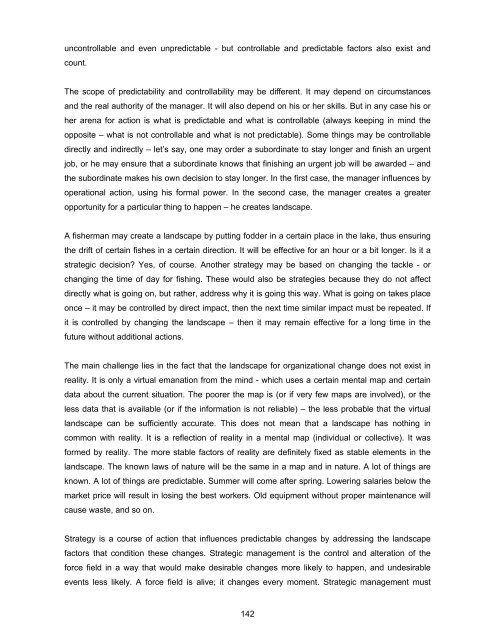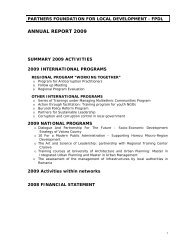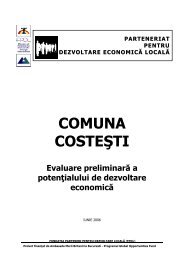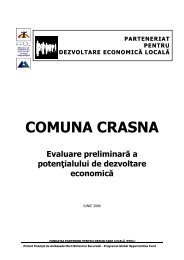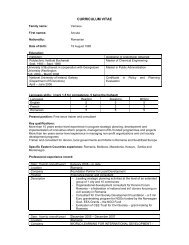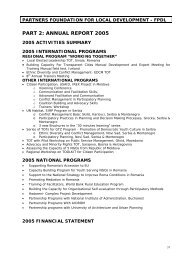Organizational Development: A Manual for Managers and ... - FPDL
Organizational Development: A Manual for Managers and ... - FPDL
Organizational Development: A Manual for Managers and ... - FPDL
Create successful ePaper yourself
Turn your PDF publications into a flip-book with our unique Google optimized e-Paper software.
uncontrollable <strong>and</strong> even unpredictable - but controllable <strong>and</strong> predictable factors also exist <strong>and</strong><br />
count.<br />
The scope of predictability <strong>and</strong> controllability may be different. It may depend on circumstances<br />
<strong>and</strong> the real authority of the manager. It will also depend on his or her skills. But in any case his or<br />
her arena <strong>for</strong> action is what is predictable <strong>and</strong> what is controllable (always keeping in mind the<br />
opposite – what is not controllable <strong>and</strong> what is not predictable). Some things may be controllable<br />
directly <strong>and</strong> indirectly – let’s say, one may order a subordinate to stay longer <strong>and</strong> finish an urgent<br />
job, or he may ensure that a subordinate knows that finishing an urgent job will be awarded – <strong>and</strong><br />
the subordinate makes his own decision to stay longer. In the first case, the manager influences by<br />
operational action, using his <strong>for</strong>mal power. In the second case, the manager creates a greater<br />
opportunity <strong>for</strong> a particular thing to happen – he creates l<strong>and</strong>scape.<br />
A fisherman may create a l<strong>and</strong>scape by putting fodder in a certain place in the lake, thus ensuring<br />
the drift of certain fishes in a certain direction. It will be effective <strong>for</strong> an hour or a bit longer. Is it a<br />
strategic decision? Yes, of course. Another strategy may be based on changing the tackle - or<br />
changing the time of day <strong>for</strong> fishing. These would also be strategies because they do not affect<br />
directly what is going on, but rather, address why it is going this way. What is going on takes place<br />
once – it may be controlled by direct impact, then the next time similar impact must be repeated. If<br />
it is controlled by changing the l<strong>and</strong>scape – then it may remain effective <strong>for</strong> a long time in the<br />
future without additional actions.<br />
The main challenge lies in the fact that the l<strong>and</strong>scape <strong>for</strong> organizational change does not exist in<br />
reality. It is only a virtual emanation from the mind - which uses a certain mental map <strong>and</strong> certain<br />
data about the current situation. The poorer the map is (or if very few maps are involved), or the<br />
less data that is available (or if the in<strong>for</strong>mation is not reliable) – the less probable that the virtual<br />
l<strong>and</strong>scape can be sufficiently accurate. This does not mean that a l<strong>and</strong>scape has nothing in<br />
common with reality. It is a reflection of reality in a mental map (individual or collective). It was<br />
<strong>for</strong>med by reality. The more stable factors of reality are definitely fixed as stable elements in the<br />
l<strong>and</strong>scape. The known laws of nature will be the same in a map <strong>and</strong> in nature. A lot of things are<br />
known. A lot of things are predictable. Summer will come after spring. Lowering salaries below the<br />
market price will result in losing the best workers. Old equipment without proper maintenance will<br />
cause waste, <strong>and</strong> so on.<br />
Strategy is a course of action that influences predictable changes by addressing the l<strong>and</strong>scape<br />
factors that condition these changes. Strategic management is the control <strong>and</strong> alteration of the<br />
<strong>for</strong>ce field in a way that would make desirable changes more likely to happen, <strong>and</strong> undesirable<br />
events less likely. A <strong>for</strong>ce field is alive; it changes every moment. Strategic management must<br />
142


